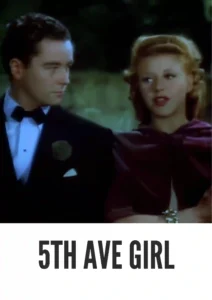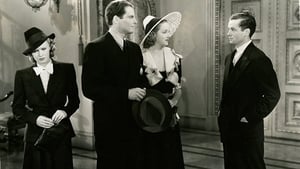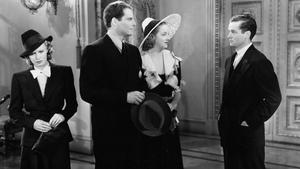Video Sources 0 Views

Synopsis
Review: 5th Ave Girl 1939 Colorized – Exploring the Charms of a Classic Romantic Comedy

Introduction
In the golden age of Hollywood cinema, the year 1939 stands out as a particularly remarkable one, filled with iconic films that have since become classics. Among these gems is the delightful romantic comedy “5th Ave Girl 1939.” Directed by the adept Gregory La Cava, this film showcases the charm and wit of its era, offering a fresh perspective on the genre. The film stars Ginger Rogers and Walter Abel, who deliver performances that have endured through the decades. This article delves into the significance of “5th Ave Girl 1939,” exploring its narrative, characters, and the impact it has had on the romantic comedy genre.
Check The Full Colorized Movies List
Check Our Colorized Movies Trailer Channel
Understanding 5th Ave Girl 1939 Colorized: Director, Cast, and Genre
“5th Ave Girl 1939” is a quintessential example of the romantic comedy genre, a form that was particularly popular during the 1930s and 1940s. Directed by Gregory La Cava, known for his work on “My Man Godfrey” and “The Scoundrel,” the film embodies the director’s knack for blending humor with social commentary.
The cast of “5th Ave Girl 1939” includes Ginger Rogers, who shines in the role of a charming and unconventional woman, and Walter Abel, who plays a wealthy but disillusioned businessman. Rogers, celebrated for her versatility and grace, brings a refreshing vibrancy to her role, while Abel’s performance adds depth and nuance to the film’s central romance.
The film navigates the conventions of romantic comedy with a sophisticated blend of satire and romance, set against the backdrop of 1930s Manhattan. La Cava’s direction ensures that the film remains both entertaining and thought-provoking, reflecting the social and economic realities of the time.
Exploring the World of 5th Ave Girl 1939 Colorized: Plot and Characters
The plot of “5th Ave Girl 1939” centers on a whimsical tale of romance and social satire. Ginger Rogers plays a character named Kay, an aspiring actress who finds herself in an unusual predicament. She becomes involved with a wealthy family whose patriarch, played by Walter Abel, is seeking to escape the constraints of his high-society life.
Kay’s introduction into the lives of the wealthy family brings a breath of fresh air and a touch of humor to their otherwise monotonous existence. The film explores themes of love, class, and societal expectations with a lighthearted yet insightful approach. The interactions between Kay and the family members offer both comedic and poignant moments, highlighting the contrasts between their worlds.
Key characters include the charming but disillusioned businessman, whose search for genuine connection and purpose is contrasted with the superficiality of his social circle. Kay, on the other hand, represents a more down-to-earth perspective, providing a counterpoint to the wealth and privilege that dominate the family’s world.
The Art of Classic Hollywood Romantic Comedy
The romantic comedy genre of the 1930s was characterized by its clever dialogue, engaging characters, and often, a satirical take on social norms. Films of this era frequently featured strong, independent female leads and witty banter, capturing the spirit of the time.
Classic Hollywood romantic comedies often employed a formulaic structure: a chance meeting, romantic entanglements, and a satisfying resolution. However, they also provided a platform for exploring contemporary issues in a light-hearted manner, offering both escapism and commentary.
In “5th Ave Girl 1939,” the genre’s conventions are employed with a keen sense of timing and social observation. The film not only entertains but also subtly critiques the class distinctions and societal expectations of its time, making it both a product of its era and a reflection on universal themes.
Early 20th Century Film Trends and Innovations
The late 1930s were a period of significant innovation in Hollywood. The introduction of color films, advancements in sound technology, and the evolution of narrative storytelling all contributed to the richness of the cinematic landscape. Although “5th Ave Girl 1939” is a black-and-white film, it benefits from the period’s technical and artistic innovations.
The film’s cinematography, though constrained by the technological limits of the time, captures the glamour and energy of 1930s New York. The use of lighting, set design, and costume further enhances the film’s charm, reflecting the era’s aesthetic sensibilities.
5th Ave Girl 1939 and Its Place in Film History
“5th Ave Girl 1939” occupies a special place in film history as a delightful example of the romantic comedy genre during its heyday. The film’s blend of humor, romance, and social critique exemplifies the qualities that made 1930s romantic comedies so enduring.
The film’s success is attributed to its engaging performances, witty screenplay, and La Cava’s adept direction. It remains a cherished part of the romantic comedy canon, illustrating the genre’s appeal and its capacity to offer both entertainment and insightful commentary.
The Impact of 5th Ave Girl 1939 Colorized on Romantic Comedy
“5th Ave Girl 1939” has had a lasting impact on the romantic comedy genre, influencing subsequent films with its blend of humor and social critique. The film’s approach to romance and class dynamics can be seen in later romantic comedies that explore similar themes with a modern twist.
The film’s success helped solidify Ginger Rogers’ reputation as a leading actress in romantic comedies, and its impact is evident in the continued popularity of films that combine romance with social satire. The enduring appeal of “5th Ave Girl 1939” underscores the timeless nature of its themes and the skillful craftsmanship behind its creation.
Director Gregory La Cava’s Cinematic Legacy
Gregory La Cava’s contributions to cinema extend beyond “5th Ave Girl 1939,” encompassing a diverse body of work that includes both comedies and dramas. His films are known for their sharp wit, engaging characters, and insightful social commentary.
La Cava’s ability to blend humor with social critique is evident in his other works, such as “My Man Godfrey” and “The Scoundrel.” His films often explore the complexities of social class and human relationships, reflecting his keen understanding of the human condition.
Themes Explored in 5th Ave Girl 1939 Colorized
“5th Ave Girl 1939” delves into themes of love, social class, and personal fulfillment. The film offers a critique of the superficiality of high society, contrasting it with the authenticity and charm of its protagonist, Kay.
The exploration of these themes is achieved with a blend of humor and sensitivity, allowing the film to engage with serious topics while remaining entertaining. The romantic elements of the film are intertwined with its social observations, creating a narrative that resonates with audiences on multiple levels.
Reception and Legacy of 5th Ave Girl 1939 Colorized
Upon its release, “5th Ave Girl 1939” received positive reviews for its engaging performances, witty dialogue, and La Cava’s direction. Critics praised the film’s ability to blend romance and social satire, highlighting its appeal as both a romantic comedy and a commentary on societal norms.
The film’s legacy endures through its influence on the romantic comedy genre and its continued enjoyment by audiences. “5th Ave Girl 1939” remains a testament to the creativity and charm of classic Hollywood cinema, offering a delightful escape while also providing thoughtful reflections on love and society.
Where to Watch 5th Ave Girl 1939 Colorized Online
For those interested in experiencing the timeless charm of “5th Ave Girl 1939,” the film is available on various streaming platforms and through classic film collections. Its availability ensures that new generations of viewers can enjoy this classic romantic comedy and appreciate its place in film history.
FAQs About 5th Ave Girl 1939 Colorized
Q: Who wrote the screenplay for “5th Ave Girl 1939”?
A: The screenplay for “5th Ave Girl 1939” was written by William Morrow and William Conselman, who crafted a witty and engaging script that complements La Cava’s direction.
Q: What is the significance of the film’s title?
A: The title “5th Ave Girl” refers to the protagonist, Kay, and her connection to New York’s Fifth Avenue, a symbol of wealth and high society. The title highlights the contrast between Kay’s down-to-earth nature and the affluent world she enters.
Q: How does “5th Ave Girl 1939” compare to other romantic comedies of its time?
A: “5th Ave Girl 1939” stands out for its combination of romance and social satire, offering a unique perspective on class and relationships. Its engaging performances and sharp script make it a notable example of the romantic comedy genre during the 1930s.
Conclusion
In conclusion, “5th Ave Girl 1939” remains a delightful and enduring example of classic Hollywood romantic comedy. Directed by Gregory La Cava and starring Ginger Rogers and Walter Abel, the film offers a charming and insightful exploration of romance, social class, and personal fulfillment. Its blend of humor, romance, and social critique continues to resonate with audiences, reflecting the timeless appeal of its themes and the skillful craftsmanship behind its creation. As we revisit this classic film, we are reminded of the enduring power of cinema to entertain, inspire, and reflect on the complexities of the human experience.















